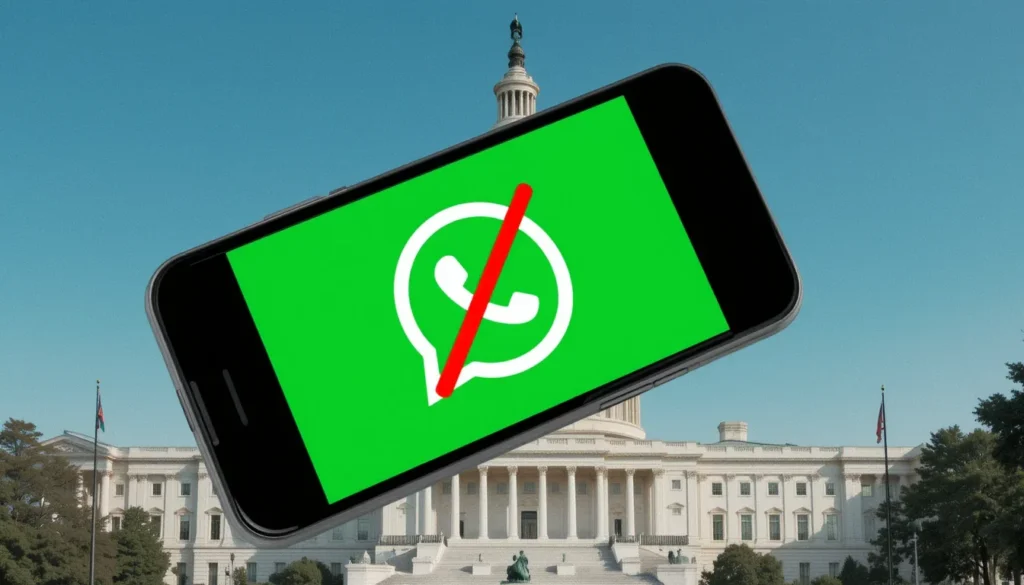Overview
In a decisive move to strengthen cybersecurity and ensure adherence to federal data handling protocols, the U.S. House of Representatives has formally banned the use of WhatsApp on all official devices. This step aims to mitigate the risks of data leaks, espionage, and compliance violations, as the popular messaging platform is deemed non-compliant with U.S. government data protection standards.
Key Facts
- The ban targets official U.S. House-managed mobile devices.
- This action follows multiple data security concerns regarding third-party messaging apps.
- The ban was enforced by the Chief Administrative Officer (CAO) of the House.
- WhatsApp lacks essential data governance and retention capabilities required by federal agencies.
- Lawmakers and staff are advised to use approved communication tools only.
- This measure aligns with the broader federal initiative to ensure secure government communications.
What’s Verified and What’s Still Unclear
✅ Verified:
- The CAO has confirmed the WhatsApp ban through internal communications.
- WhatsApp’s end-to-end encryption and data policies are not in line with U.S. House standards.
- The decision affects all House members, staff, and contractors using official devices.
❓ Still Unclear:
- Whether similar action will be taken against other apps like Signal or Telegram.
- If retrospective audits will be conducted on prior WhatsApp use.
- Whether the ban will extend to Senate or other branches of government.
Timeline of Events
- March 2024: Concerns raised about third-party app usage in government communications.
- May 2024: Internal review initiated by House IT security teams.
- June 20, 2025: CAO issues formal notice of WhatsApp ban on official devices.
- June 25, 2025: Ban takes effect, with immediate compliance required.
Who’s Behind It?
The directive was issued by the Chief Administrative Officer (CAO) of the U.S. House, the office responsible for ensuring IT governance, data privacy, and security across all House-operated systems. The decision was made in coordination with federal cybersecurity advisors and compliance officers after a comprehensive risk evaluation.
Public & Industry Response
📰 Public Reaction:
The public has shown mixed reactions. Some privacy advocates support the ban as a necessary step in safeguarding sensitive communications. Others argue that banning WhatsApp could limit accessibility and usability for lawmakers who depend on it for cross-border communication.
💼 Industry Reaction:
- Cybersecurity experts welcomed the move as a strong stance on compliance.
- Meta (WhatsApp’s parent company) has not yet issued a public response.
- Tech commentators suggest this might trigger similar actions across other federal agencies.
What Makes This Unique?
Unlike generic app bans, this one stems from a federal-level cybersecurity compliance audit, not merely technical vulnerabilities. The U.S. House’s decision is notable because it:
- Highlights WhatsApp’s non-compliance with U.S. data retention laws.
- Demonstrates government-wide tightening of digital communication standards.
- Could set a precedent for other global legislative bodies considering app bans.
Understanding the Basics
Why WhatsApp is a Problem for Government Use:
- It uses end-to-end encryption, which means no official records can be kept.
- Messages cannot be archived, monitored, or retrieved if needed for investigations.
- Foreign data hosting could pose risks to national security.
- Compliance with FOIA (Freedom of Information Act) and legal discovery is hindered.
What Happens Next?
Going forward, the House IT department is:
- Rolling out secure alternatives like Microsoft Teams and Signal (government edition).
- Training House members and staff on approved apps and safe communication practices.
- Monitoring devices for any non-compliant applications and taking remedial actions.
It’s expected that other agencies and possibly the U.S. Senate will adopt similar bans in the near future. This is part of a broader government initiative to modernize digital governance and combat nation-state cyber threats.
Summary
The U.S. House WhatsApp ban on official devices marks a turning point in how federal institutions approach secure communication. It highlights the growing tension between consumer technology and institutional compliance needs. While WhatsApp remains widely popular globally, its incompatibility with U.S. government standards may serve as a wake-up call to both users and tech companies.
As digital communication becomes increasingly central to governance, the focus on data privacy, compliance, and security will only intensify. The WhatsApp ban isn’t just a restriction—it’s a signal that national cybersecurity cannot afford weak links.
